Babette’s Table: Using Projections to Grow with Intention
May 25, 2023
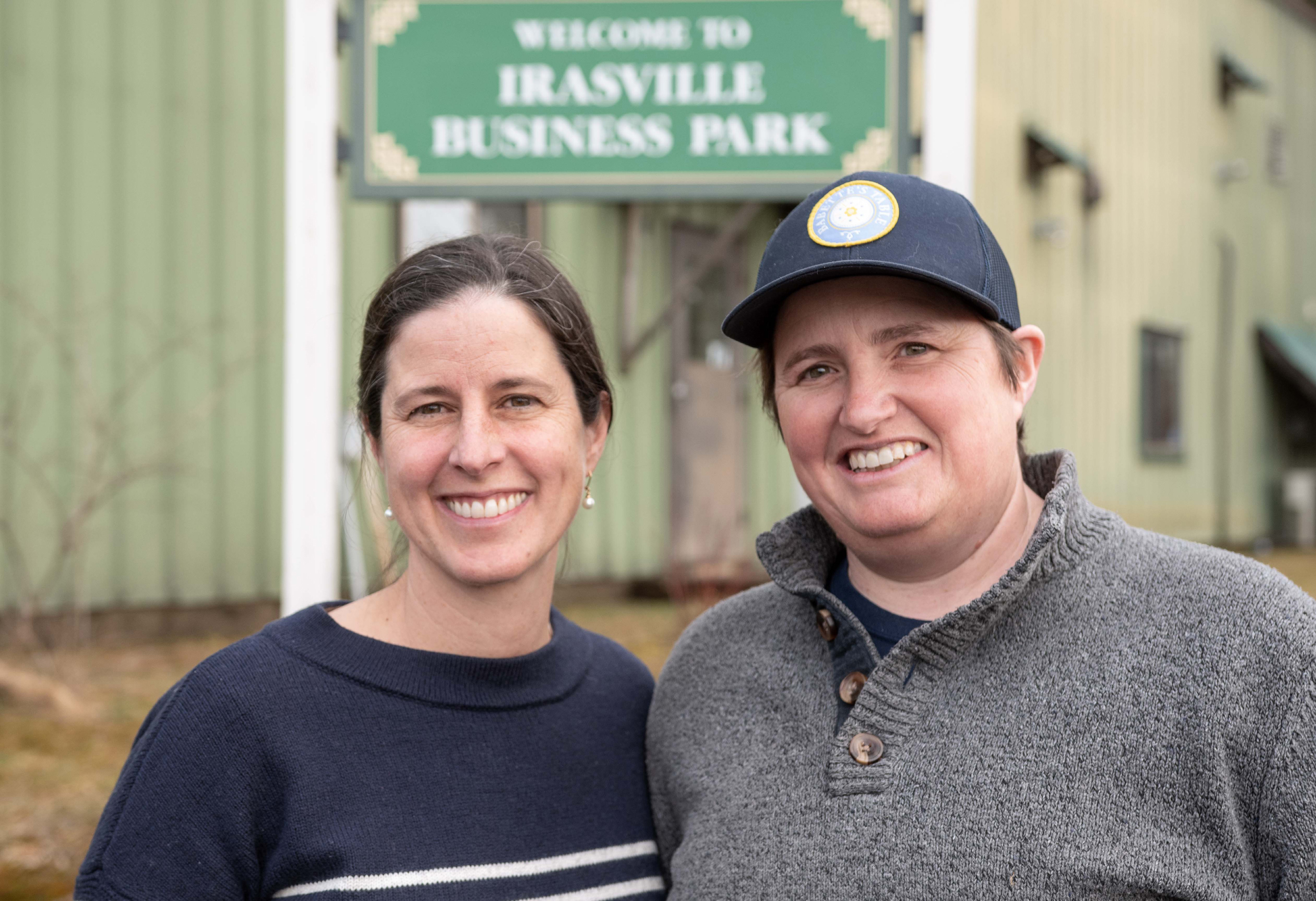
How understanding the small details helped Babette’s Table see the big picture.
Running a business and raising two young children together, Erika Lynch and Julie Morton, owners of Babette’s Table in Waitsfield, had an idea they thought would make life a little easier. Since they owned the business, why not move it closer to home? Doing so, they reasoned, would eliminate the commute and add precious hours to their day, hours they could spend with their daughters.
“Now it seems like a distant dream,” laughs Erika. “We’ve taken a different, more intentional path to growth. And it’s still one that allows me to be home for dinner most nights.”
From teaching to butchery.
Erika opened Babette’s Table in 2017 after a “stage,” or apprenticeship, in France where she learned butchery and curing with Dominique Chapolard, and how to make pate, duck confit, and other charcuterie with professional cook, Kate Hill. She and Julie, on maternity leave at the time with their second daughter, were struck by the slow food movement in Europe.
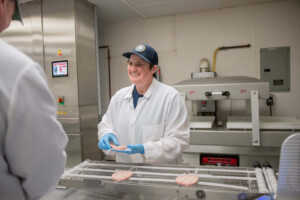
Erika Lynch says the company is focused on supporting their employees, growing sales, and expanding relationships with their hog farmer partners. Photo by Erica Houskeeper.
“The power of that was really significant,” said Julie. “It was a ‘seed to sausage’ farm process that was about local agriculture and knowing your farmers well. It really sparked our interest in creating tighter connections in local food back home.”
Erika agreed. “So much can happen around a table with people sharing good food. In my family, it’s not uncommon for 40 or 50 people to get together for a potluck at the drop of a hat. The food is part of it, but it’s not the center. Family and community are at the center.”
Returning home to Vermont, Erika decided to leave her teaching position at ReSource to work with Jacob Finsen, owner of Artisan Meats of Vermont. “I knew I wanted to start my own business and Jacob was really supportive of that,” she said. “I’m so grateful to him. I still had a lot to learn. I had never experienced the requirements of a regulatory body like the USDA.”
Within a year, Erika opened Babette’s Table at the Mad River Food Hub, producing artisanal charcuterie made with local ingredients. Julie, who had returned to her teaching position after maternity leave, decided to join the business full time, coming on to manage bookkeeping and customer service while Erika did the butchering and curing. “It’s actually incredible we had any customers at all before Julie came on,” said Erika. “She’s the real hero of the story. It took me days to even look at my email.”
They began selling Erika’s sausage, bacon, salami and other products at the Waitsfield Farmers Market.
“Our idea was whole animal butchery,” said Erika. “We would buy the whole hog from a local farmer and utilize the entire animal. It was important to us right from the beginning to support local agriculture and people.”
Opportunities and growth.
Erika’s nuanced understanding of how each ingredient affected taste was the foundation of the company’s early success. Relying on the quality of the product and word of mouth, they were selling everything they made at the market and expanding into retail at specialty food stores.
Understanding that their ability to grow was directly related to the growth of the hog farmers they were buying from, they also began making products that the farmers could sell under their own label. “It’s an important part of our model, that reciprocal relationship,” said Julie. “We need to collaborate and work closely in order for smaller businesses to participate in the economy.”
In the fall of 2019, Erika and Julie learned that Robin Morris, owner of the Mad River Food Hub, was planning to sell. He was looking for new owners that would continue the Food Hub’s commitment to local producers and agriculture. “Robin was ready to step back and it felt like the right fit,” said Erika. “It had all the freezer and refrigerator space we needed, and it also had this incredible community of producers.”
Julie and Erika renamed the Mad River Food Hub to 151 Warehouse when they took over the space in 2020. Lawson’s Finest Liquids continues to distribute from the building, which they had already been doing for many years.
“The projections drive the planning.”
“So, now we have two businesses–the warehouse and Babette’s Table,” said Erika. “And we started as humanities teachers,” Julie finishes for her with a smile.
With two young children at home and a growing business, Erika and Julie considered moving their business closer to home. “Running a business was new to us,” said Julie. “Everything we had done up to that point was in Erika’s head. We didn’t have great systems in place to make a big decision. We were doing a lot of guessing.”
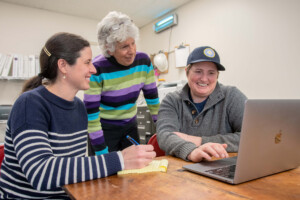
Vermont Sustainable Jobs Fund business coach Jean Kissner, center, reviews business projections with Julie Morton and Erika Lynch. Photo by Erica Houskeeper.
They reached out to the Vermont Sustainable Jobs Fund (VSJF) and were connected with business coaches Jean Kissner and John Ryan in January of 2022.
“The idea of moving came with a sense of needing to grow,” said Ryan. “In order to meet their own financial needs and be able to pay their farmers and employees at a sustainable rate, which was important to them, they had to dig into margins and determine whether they were making enough money.”
Kissner agreed. “They had to think methodically through production, sales, products, customers, and marketing before they could make that decision. The projections drive everything.”
As they dug into the details with their coaches to more deeply understand the business, Erika and Julie honed in on two priorities: to be good employers and to support local agriculture. “That’s where we started,” said Julie. “A lot has changed, but we are determined to stick by our commitment to people and local agriculture.”
“Our work with Jean and John revealed that if we are committed to local pork, which we are, it’s going to be more expensive. So, we have to be super efficient in order to stay true to our values and priorities and run a profitable business,” said Julie.
An intentional path forward.
With plans and projections for the business rooted in their values, Erika and Julie have entered what they call a “fun and creative phase” of the business.
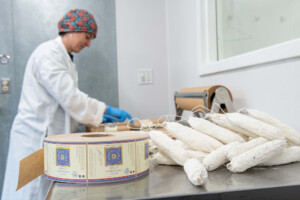
Julie Morton packages dried pork sausage at Babette’s Table in Waitsfield. Photo by Erica Houskeeper.
For now, they have put any discussion of moving on hold, focusing instead on supporting their employees, growing sales, and expanding relationships with their hog farmer partners including Kelsey and Phelan O’Connor at Pigasus Meats, Ben Nottermann at Snug Valley Farm, Sebastian von Trapp at von Trapp Farmstead, and Asa Baer and Caitlin Bingham at Knob Hill Farm. “This is hard work,” said Erika. “We want our employees and the farmers we buy from to feel appreciated and well taken care of.”
“Jean and John helped us get to an exciting place,” said Julie. “We’re thinking about growth, new products, and have a better sense of how to plan, how to build the business. We have two employees and can grow in a way that’s really intentional.”
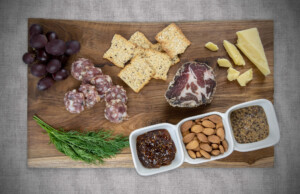
A Babette’s Table artisanal charcuterie spread paired with local cheese, mustard, jam and almonds. Photo by Erica Houskeeper.
About VSJF’s Business Management Coaching Program
The Vermont Sustainable Jobs Fund provides tailored, high-touch planning, coaching, and advising for business owners and their management teams to advance profitability, job creation, and sustainable job development. Click for more information about business management coaching. Funding support for our coaching program is provided by client fees, the Vermont Agency of Agriculture, Food and Markets and Vermont Housing & Conservation Board’s Farm & Forest Viability Program.
Read More Stories Like This:
- Bobolink Yarns: Scaling Back to Find Success
- Hemp and Cannabis Pioneer, Scott Sparks, Navigates Legalization in Vermont
- Business Sense Training Series for Entrepreneurs and Small Business Owners
- Pioneers of African Cuisine, Global Village Foods Finds Community in Vermont
- For Olivia’s Croutons Founder, Coaching is the Best Thing Since Sliced Bread




